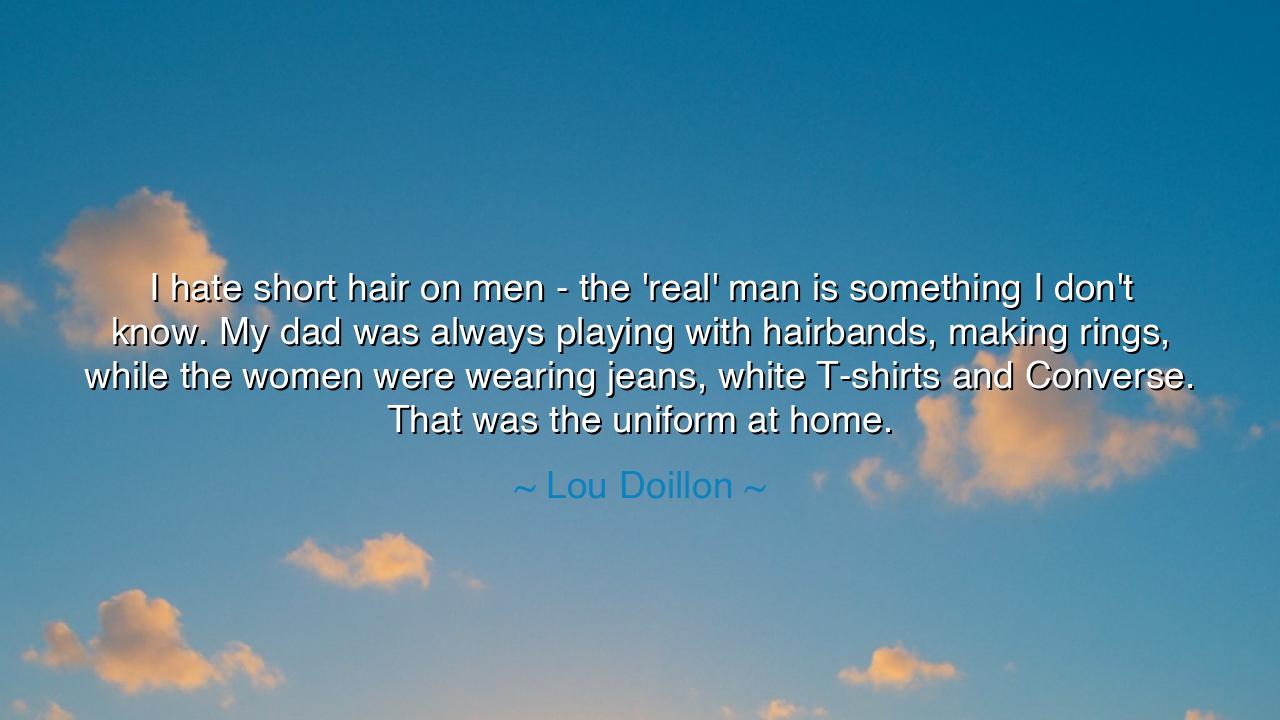
I hate short hair on men - the 'real' man is something I don't
I hate short hair on men - the 'real' man is something I don't know. My dad was always playing with hairbands, making rings, while the women were wearing jeans, white T-shirts and Converse. That was the uniform at home.






When Lou Doillon spoke the words, “I hate short hair on men — the ‘real’ man is something I don’t know. My dad was always playing with hairbands, making rings, while the women were wearing jeans, white T-shirts, and Converse. That was the uniform at home,” she was not simply describing her childhood home; she was unveiling a truth about freedom, identity, and the fluid nature of strength. In her reflection, the boundaries of manhood and womanhood blur, revealing a deeper wisdom: that authenticity—not conformity—is the true measure of a person. Her words carry the fragrance of a household where art replaced authority, where creativity outshone convention, and where each soul was permitted to define itself in its own light.
Born into a family of artists, musicians, and actors, Lou Doillon, daughter of the legendary Jane Birkin and filmmaker Jacques Doillon, inherited not only their artistry but also their rebellion against rigid norms. In her father’s hands—those same hands that shaped films—there were no boundaries of what a man “should” be. He wore hairbands, crafted rings, and moved through the home like a poet rather than a patriarch. And the women—dressed not for decoration but for comfort and motion—embodied a quiet power, a natural independence that required no ornament to assert itself. Thus, her upbringing became a living parable of balance between the masculine and the feminine, between softness and strength, form and freedom.
To the ancients, such a home would have been sacred ground, for they too knew that wisdom dwells in harmony, not division. The Taoists of China spoke of yin and yang—two energies, neither superior, both essential. The Greeks, too, revered androgyny as a divine state, a symbol of completeness within the soul. In every age, there have been those who understood that when men are free to be gentle and women free to be strong, humanity rises nearer to its truth. Yet society, chained by its own fears, has long tried to confine spirit within walls of expectation. Lou Doillon’s words break those walls; they sing of a household that lived without such limits, where art replaced hierarchy, and love was expressed in authenticity, not performance.
Think of the painter Claude Monet, whose life, like Doillon’s household, defied simplicity. He was a man who painted not as a warrior conquers a canvas, but as a lover studies light. In his garden at Giverny, he cultivated color and quietude—his masculinity expressed through tenderness, his strength found in sensitivity. While others sought to define manhood in power or possession, Monet’s was found in creation. Likewise, Doillon’s father, crafting rings and playing with hairbands, was not betraying manhood but redefining it, teaching that art and emotion are as noble as steel and conquest.
In her words, when she says she doesn’t know the “real man,” we hear not ignorance, but wisdom born of freedom. For what is the “real man”? Is he the warrior, the provider, the stoic? Or is he the thinker, the artist, the nurturer? Perhaps he is all of these—and none entirely. Lou’s uncertainty is the wisdom of one who has seen that the true self cannot be confined by gendered ideals. Her childhood home, where roles dissolved into humanity, became a temple of the spirit’s equality. There, men could adorn and women could command; there, love and creativity were the only rules.
Her mother and sisters, dressed in jeans, white T-shirts, and Converse, symbolize simplicity and authenticity—the rejection of vanity for essence. This “uniform” is not rebellion for its own sake but an emblem of clarity: that one’s worth does not lie in the trappings of appearance, but in the depth of being. The family, dressed alike, lived in a world of art and intellect where gender did not dictate expression. It was a sanctuary where the human soul could breathe unmasked. And so, Lou’s words become a quiet manifesto for those weary of definitions—an invitation to live by truth rather than tradition.
To those who would learn from her reflection, take this lesson: do not let society define your spirit. Whether you are man or woman, resist the narrow scripts that the world writes for you. Be gentle if you wish, fierce if you must, but above all, be real. Let your life, like Lou’s family, be your own creation—where art replaces armor, where comfort is chosen over costume, where the only “uniform” is authenticity. For in such a life, the masculine and feminine no longer war, but dance; and from that dance arises the purest expression of humanity.
Thus, the teaching is this: the truest strength is not in separation, but in wholeness. The “real man” and the “real woman” are illusions; only the real soul endures. Live so that your life, too, becomes a work of art—neither bound by roles nor afraid of tenderness. For the world does not need more men or women—it needs more whole beings, unafraid to live as they truly are.






AAdministratorAdministrator
Welcome, honored guests. Please leave a comment, we will respond soon